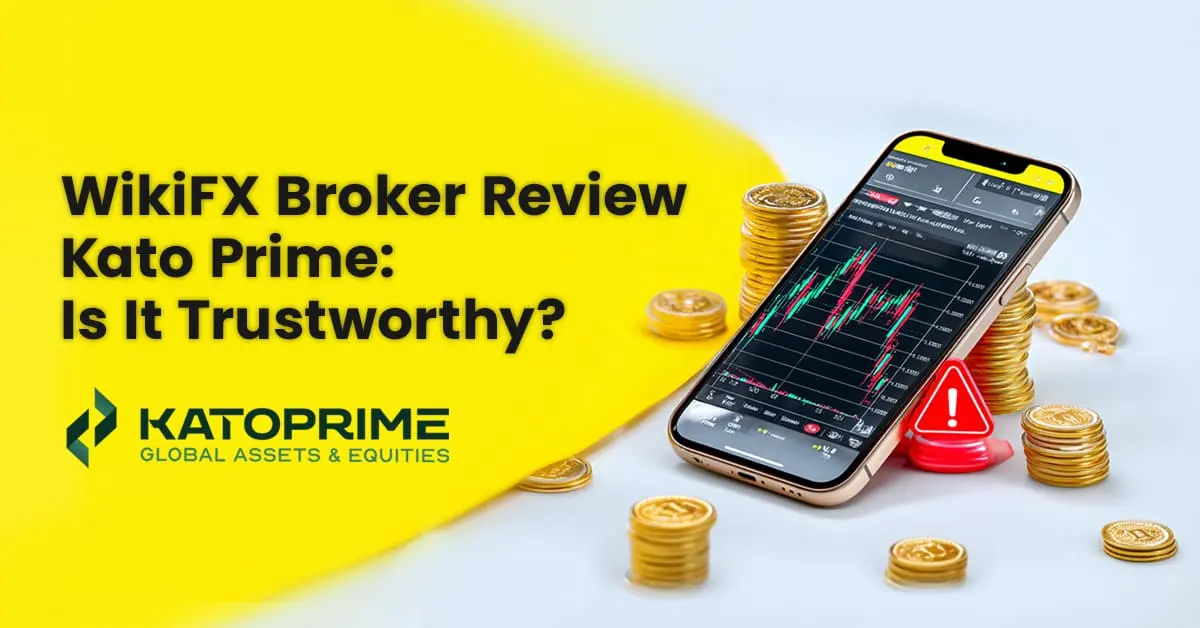简体中文
繁體中文
English
Pусский
日本語
ภาษาไทย
Tiếng Việt
Bahasa Indonesia
Español
हिन्दी
Filippiiniläinen
Français
Deutsch
Português
Türkçe
한국어
العربية
Kato Prime Under Fire: What Traders Should Know Before It’s Too Late
Abstract:Kato Prime promised lightning-fast trades and instant withdrawals, but now there are evident cracks in this broker’s story. Keep reading to see what’s behind the mask!
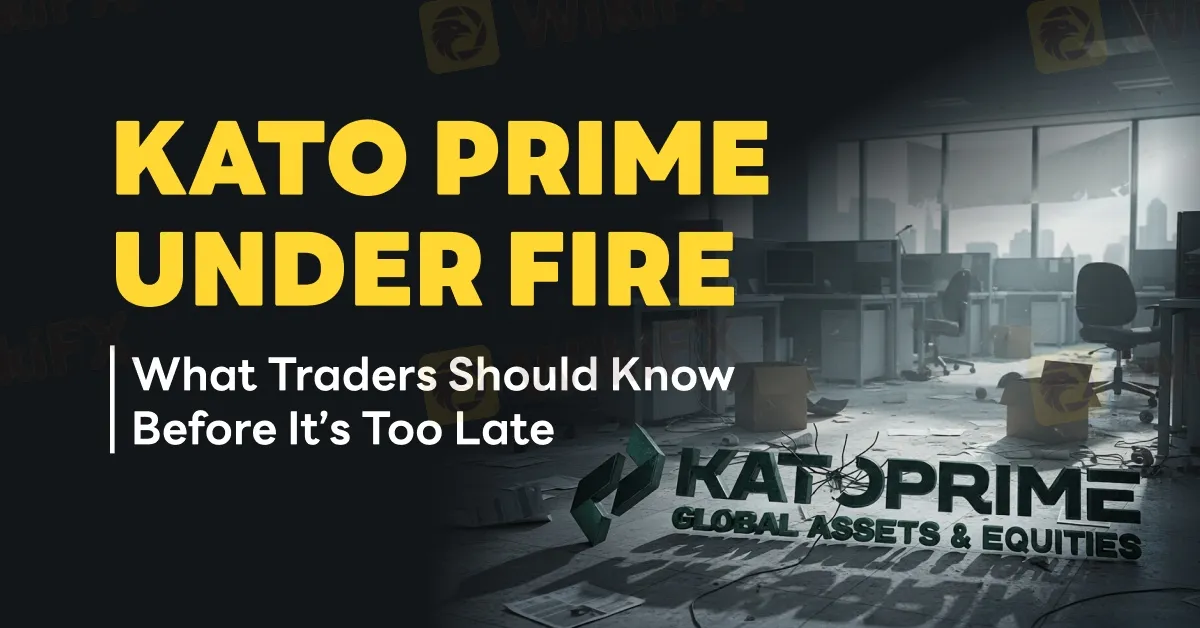
Kato Prime brands itself as a modern, low-cost online broker, offering ultra-competitive spreads, rapid withdrawals and cutting-edge trading platforms. But a detailed review from WikiFX uncovers major gaps between these claims and verifiable reality, especially in the area of regulatory oversight. Given that regulation is a cornerstone of trader protection, the brokers licence status (or lack thereof) becomes a key red flag.
Company background and marketing profile
Kato Prime is incorporated in Hong Kong under the company name Kato Prime Limited, registration number CR No. 2509294. Its registered address is shown as 9/F, Amtel Building, 148 Des Voeux Road Central, Central, Hong Kong, with a second office at Flat 7, 15/F Ho King Commercial Centre, 2-16 Fa Yuen Street, Mong Kok, Kowloon.
On its website, the broker emphasises features such as minimum deposits from US$15 for its “Standard” account, leverage up to 1:5000 spreads down to 0 pips, and “instant” deposit within 60 seconds and withdrawals “under five minutes”. It supports the widely-used MetaTrader4 (MT4) and MetaTrader5 (MT5) platforms and advertises a bespoke mobile app “coming soon”.
In its marketing copy, Kato Prime also claims to have been awarded by WikiFX (“Award winning broker by WikiFX … Best Value Broker with 7.93 high score”). But this is further from the truth!

Let‘s view WikiFX’s full review on Kato Prime here:
Regulatory status: serious deficiencies
The most critical issue raised by WikiFX and other broker-review sites is Kato Prime‘s regulatory status. WikiFX’s detailed review page lists “No Regulation” for Kato Prime. It records that the broker previously claimed to be regulated in Belize under the licence number IFSC: 000392/228 (via entity “Kato Prime Belize Ltd”), but that this regulatory licence is either revoked or not valid for the entity operating the brokers platform. For example:
- The WikiFX review lists “Belize Common Financial Service License Revoked” as part of the brokers status.
- In its 2025 review summary, WikiFX states: “It has been verified that this broker currently has no valid regulation. Please be aware of the risk!”
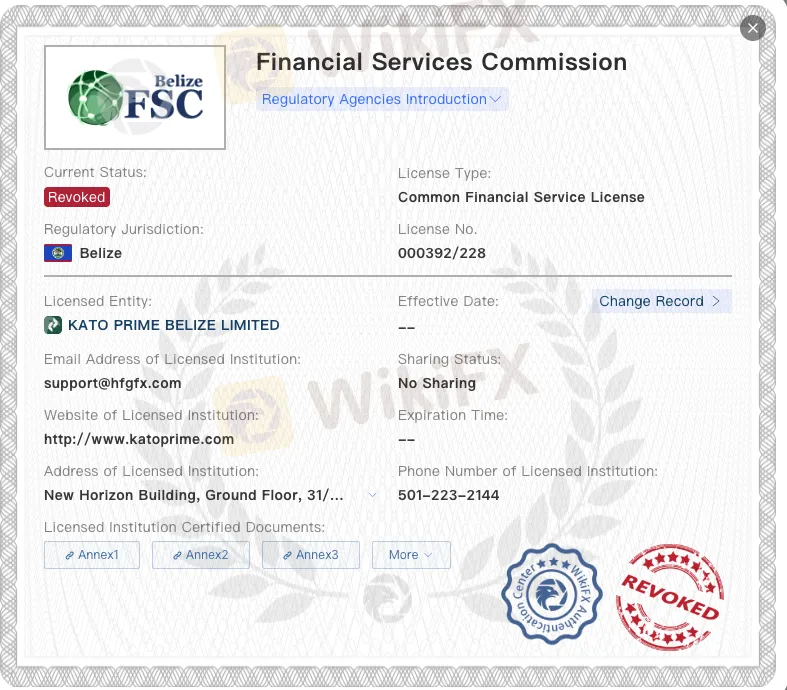
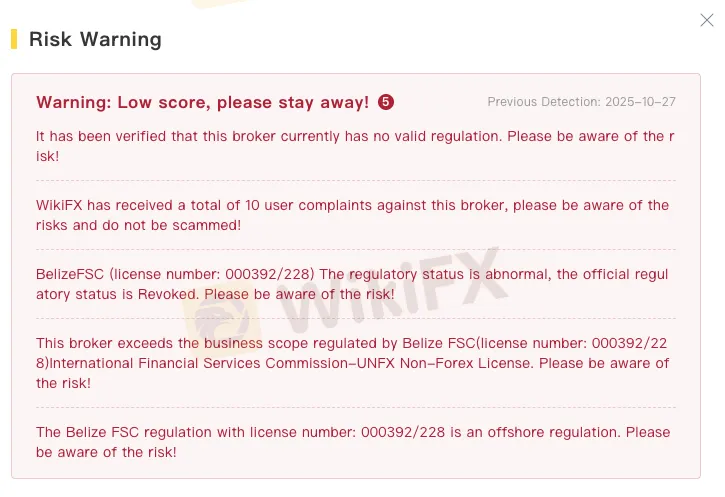
The lack of a genuinely valid license means that Kato Prime is not subject to the oversight, capital adequacy, fund-segregation and dispute resolution requirements typical of regulated brokers. This raises the risk of opaque operations, difficulty in withdrawing funds, and limited or no recourse for investors in the event of dispute or insolvency.
Transparency and operational concerns
Beyond licensing, WikiFX identifies multiple transparency issues:
- The brokers website does not clearly specify the full list of supported deposit and withdrawal methods, nor minimum/maximum transaction limits and associated fees. The brochure mentions “instant 24/7” deposits and “under five minutes” withdrawals, but lacks supporting detail.
- Kato Prime advertises that its rating on WikiFX is high and claims to have won an award from WikiFX, but, in reality, WikiFX has not issued such recognition, and the brokers actual score is considerably lower as mentioned previously.

- Multiple trader complaints via WikiFX reviews reference difficulties in withdrawing funds and account suspensions.
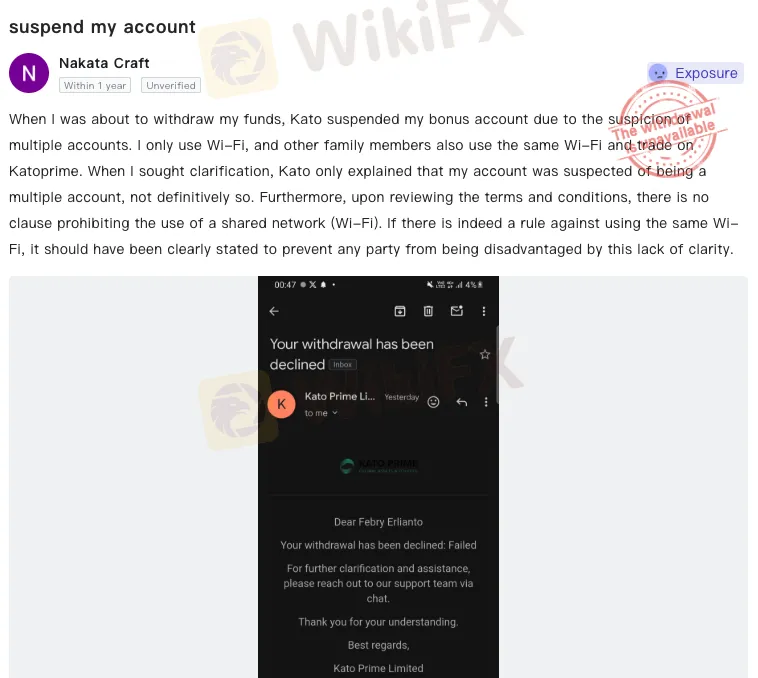
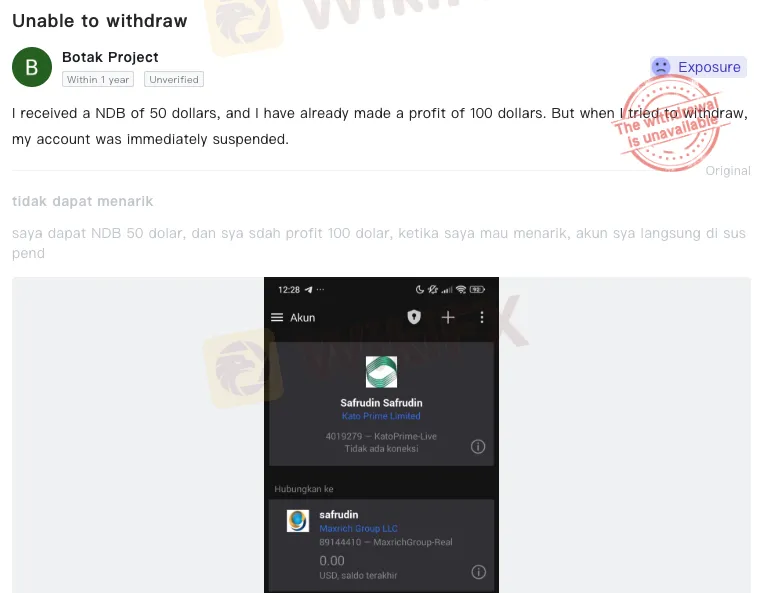
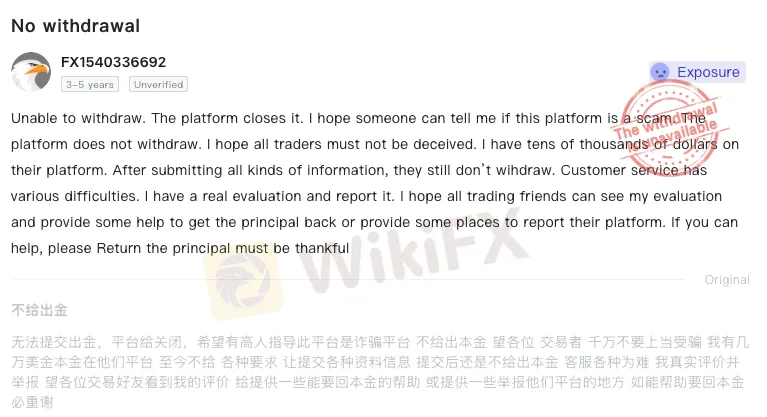
- The broker offers very high leverage (for example, 1:5000 advertised), which is highly risky, especially when combined with a broker that lacks strong regulatory oversight.
Why licensing matters
Financial regulation is the backbone of investor protection in the retail trading sector. A firm that holds a valid licence from a reputable regulator must meet standards such as segregated client funds, capital adequacy, regular audits, transparent disclosures, client complaint mechanisms, and adherence to rules around marketing, leverage, and execution.
When a broker operates without legitimate or relevant licensing, these protections are absent or severely weakened. In such cases:
- Client funds may not be held in segregated “client money” accounts, meaning in the event of insolvency or mismanagement, the funds may be at risk.
- There is typically no independent regulator supervising and enforcing conduct, so practices like misleading marketing, excessive bonus conditions, undisclosed withdrawal hurdles or unbalanced terms may persist unchecked.
- Dispute resolution becomes difficult: which entity is responsible, what jurisdiction applies, and how do you pursue a claim if the operator is offshore, unregulated, or changes names/entities?
- Leverage and inducements may be offered far beyond what regulated jurisdictions allow, which increases the risk of sudden losses for trading clients.
In Kato Primes case, the core concern is that it advertises itself as a professional broker but lacks verifiable and active regulation. WikiFX, in its review, states: “The absence of valid regulatory status” is one of the key reasons it assigns a score of just 2.16 out of 10 to Kato Prime. Without regulation, a trader handing funds to Kato Prime is exposed to a much higher degree of counterparty risk.
What does this mean for traders?
If you are considering depositing funds with Kato Prime, the following risks should be carefully weighed:
- Withdrawal difficulty: Numerous user complaints suggest that attempted withdrawals may face delays, suspensions, or account blocks. With no regulator to enforce prompt and transparent processing, you may face obstacles.
- Limited recourse: If things go wrong (e.g., the broker becomes insolvent, refuses to pay, or manipulates trades), you may not have an effective regulator to complain to or a legal umbrella to fall back on.
- Opaque bonus/trading terms: High-leverage accounts, “zero spreads”, “instant withdrawal” promises may mask high risk or hidden conditions, and without regulation, many of these may not be enforced in the traders favour.
- Potential for mis-marketing: With Kato Prime promoting non-existent awards and over-optimistic claims, the possibility of aggressive or misleading marketing is elevated.
- Jurisdictional ambiguity: The company is registered in Hong Kong (for Kato Prime Ltd), but many operations appear offshore; the prior claim of a Belize licence (now flagged as revoked) adds further ambiguity, making accountability and legal clarity weak.
WikiFXs verdict
Kato Prime presents all the glossy trappings of a retail forex/CFD broker: a low minimum deposit, a modern platform (MT4/MT5), attractive spreads, and promises of speed. However, the underlying foundation, which is to be operating with a valid, recognised regulatory licence, is missing or at best uncertain. For most retail traders, dealing with a broker that lacks credible licensing is a high-risk decision.
In short, without clear regulation, the safety of your funds, the fairness of trading conditions and your ability to seek redress are significantly compromised.
For traders who prioritise capital protection, transparency and regulatory recourse, the better path is to choose a broker licensed by a recognised tier-1 regulator (for example, Financial Conduct Authority UK, Australian Securities & Investments Commission Australia) where stricter rules apply.
Final recommendation: Join the Kato Prime Users Community
If you‘ve traded with Kato Prime or are currently using its platform, you don’t have to navigate your experience alone.
We‘re building a community group for Kato Prime users to share verified information, discuss experiences, and stay updated on any new developments affecting the broker’s operations and regulatory status.
Purpose of the group:
- Exchange honest feedback about your experiences using Kato Prime
- Learn how others handle platform-related issues (e.g. withdrawals, support responses)
- Receive updates from independent sources about market or licensing developments
- Build a network of traders who prioritise transparency and accountability
How to join:
Simply scan the QR code below to connect with the group.

Participation is voluntary, and the goal is community support and information-sharing only, and not financial advice or legal coordination.

Disclaimer:
The views in this article only represent the author's personal views, and do not constitute investment advice on this platform. This platform does not guarantee the accuracy, completeness and timeliness of the information in the article, and will not be liable for any loss caused by the use of or reliance on the information in the article.
WikiFX Broker
Latest News
ZarVista Legitimacy Check: Addressing Fears: Is This a Fake Broker or a Legitimate Trading Partner?
Gold's Historic Volatility: Liquidation Crash Meets Geopolitical Deadlock
Treasury Yields Surge as Refunding Expectations Dash; Warsh 'Hawk' Factor Looms
The Warsh Dilemma: Why the New Fed Nominee Puts Fiscal Plans at Risk
Eurozone Economy Stalls as Demand Evaporates
South African Rand (ZAR) on Alert: DA Leadership Uncertainty Rattles Markets
Nigeria Outlook: FX Stability Critical to Growth as Fiscal Revenue Surges
AUD/JPY Divergence: Aussie Service Boom Contrasts with Japan's Fiscal "Truss Moment"
ZarVista Regulatory Status: A Deep Look into Licenses and High-Risk Warnings
KODDPA Review: Safety, Regulation & Forex Trading Details
Currency Calculator



